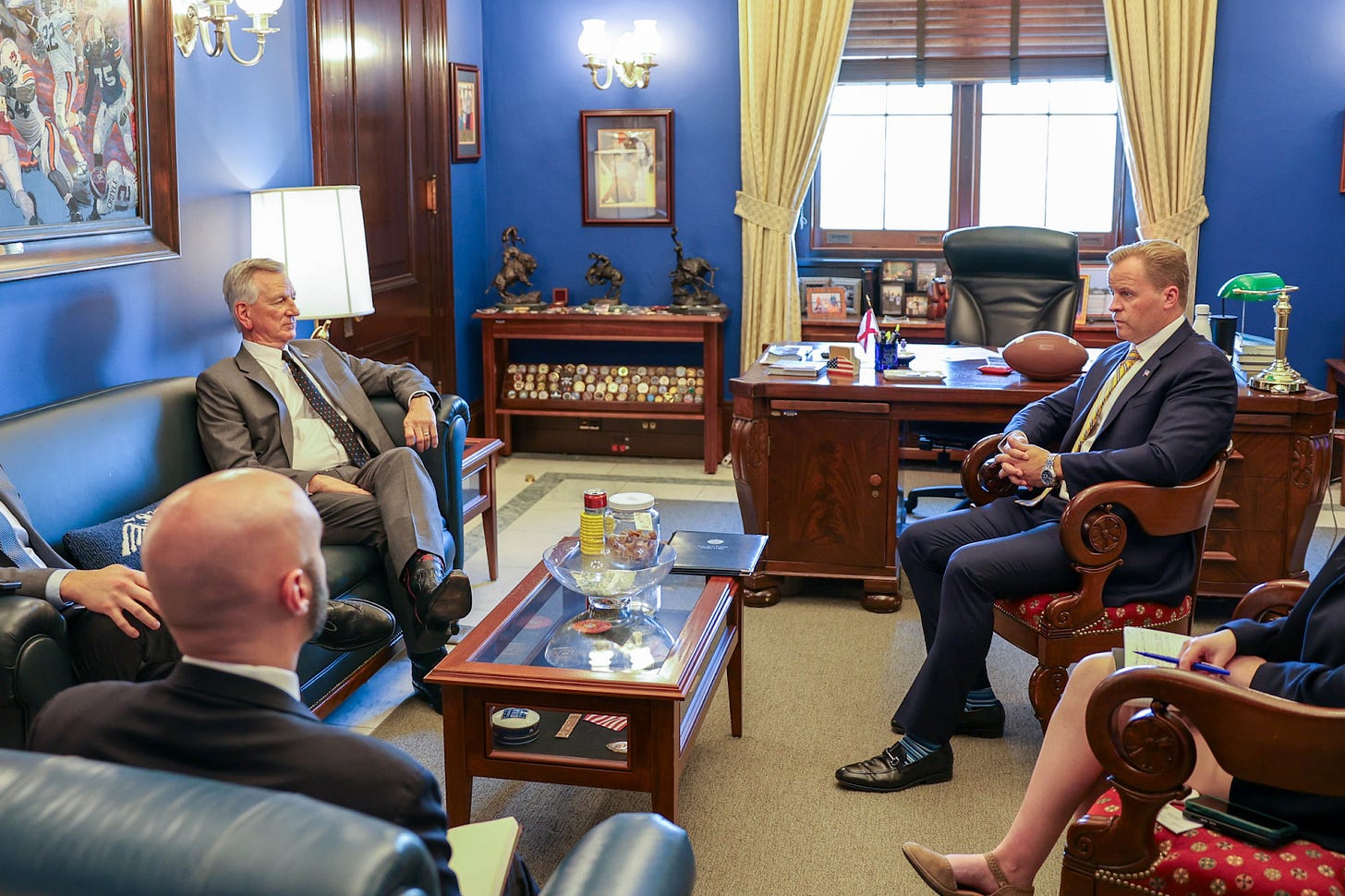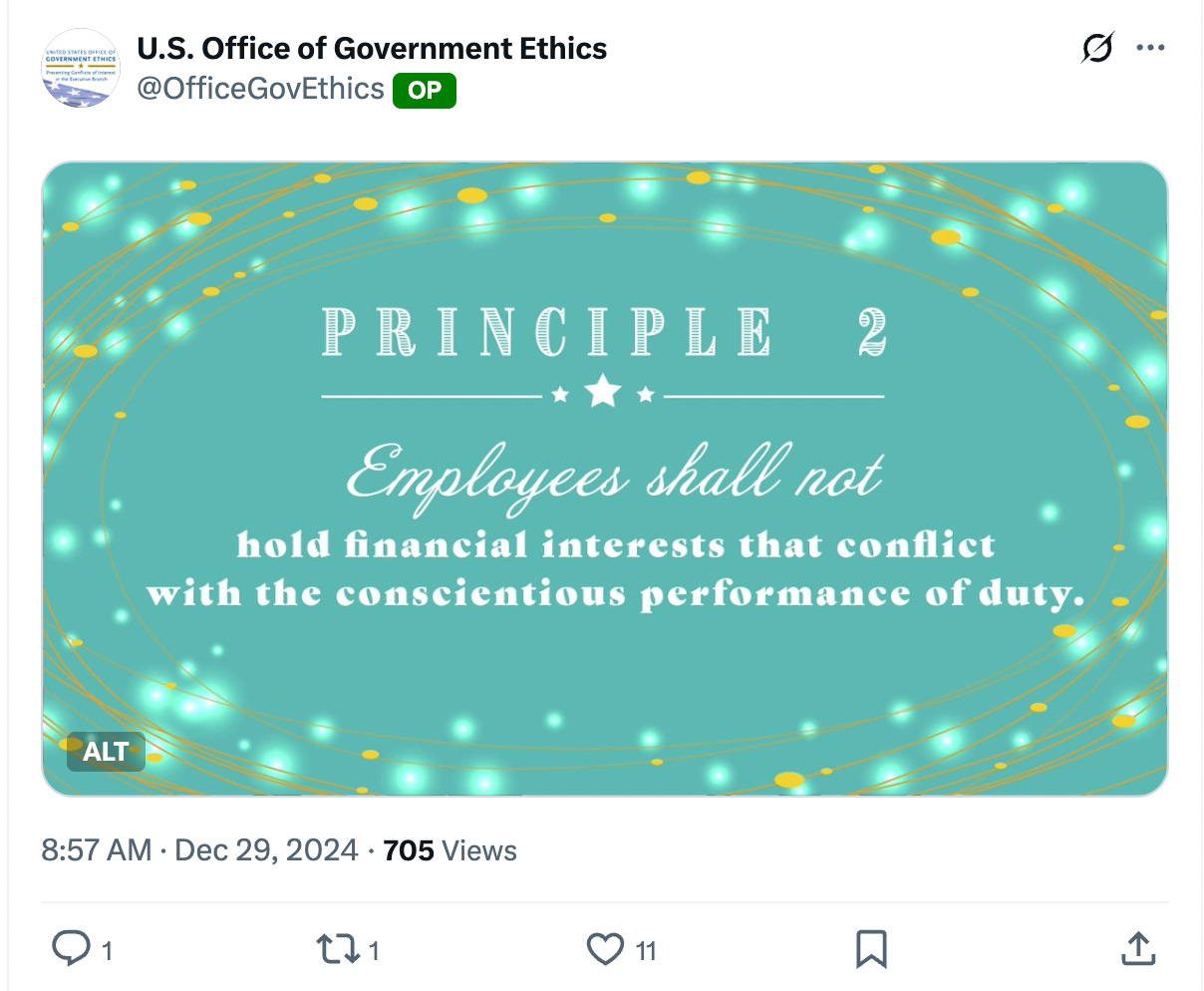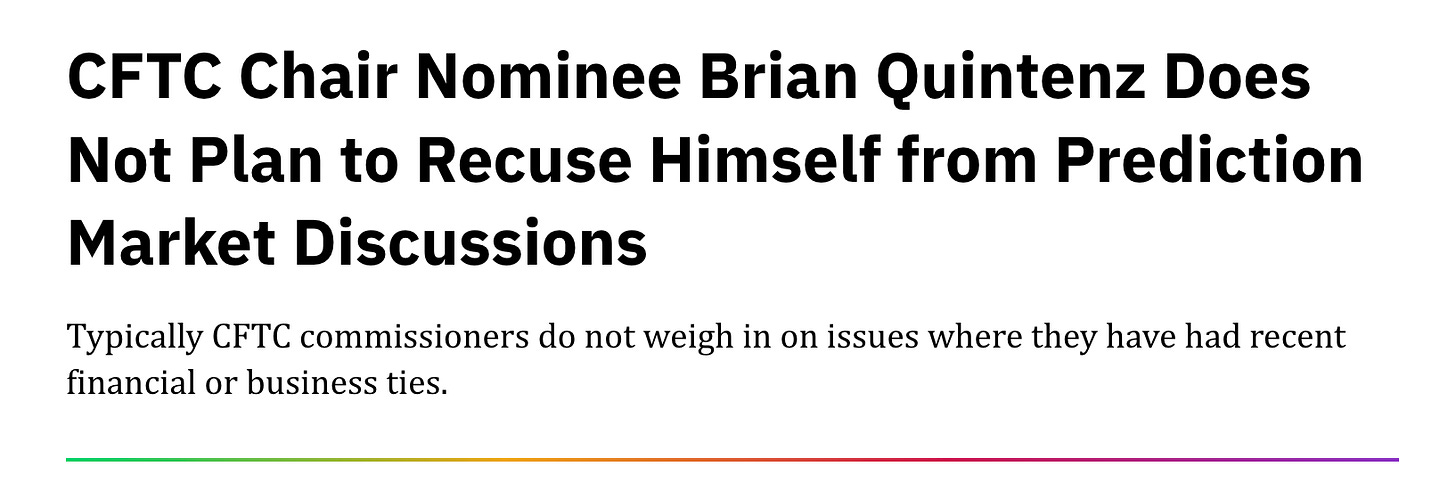Can Crypto Count on the CFTC?
The CFTC has always been crypto’s preferred regulator. But what happens when there aren't enough people to run it?

Brogan Law provides top-quality legal services to individuals and entities with questions related to cryptocurrency. Cryptocurrency law is still new, and our clients recognize the value of a nimble and energetic law firm that shares their startup mentality. To help our clients maintain a strong strategic posture, this newsletter discusses topics in law that are relevant to the cryptocurrency industry. While this letter touches on legal issues, nothing here is legal advice. For any inquiries email info@broganlaw.xyz
Brian Quintenz, A One Man Band
When then-Commissioner Summer Mersinger announced that she was leaving the CFTC in May, many were surprised. The commissioner had once been neck-in-neck with former commissioner Brian Quintenz, Trump’s nominee, to chair the CFTC and had become a dependable ally of the crypto industry.
But then, in staccato, came three more announcements: Democratic commissioner Christy Goldsmith Romero would leave along with Mersinger, Acting Chair and Republican Caroline Pham would leave after Quintenz’s confirmation, and Democrat Kristin Johnson would depart by year’s end.
And the real surprise turned out to be what was left behind.
The mass CFTC exodus leaves Quintenz as the last regulator standing. If confirmed on June 10, he will be the only remaining commissioner committed to serving on the Commission long-term. And, according to three sources connected to departing commissioners and two in communication with the White House, he might be alone for a while — the Trump administration isn’t vetting any other candidates to join him.
“The way the administration sees it is ‘we don’t like multi-member, bipartisan commissions at large, because we believe very strongly in Article II [of the Constitution]” explained a source familiar with Mersinger’s discussions with the administration. Article II of the Constitution establishes the executive branch and establishes the President’s appointment powers.
Unitary executive theory aside, this odd dynamic raises serious questions about whether the CFTC is adequately resourced to fulfill its current regulatory remit, much less the far greater regulatory burden it would absorb if the much-anticipated market structure bill working its way through Congress passes.
Is crypto’s favorite regulator really ready?
Big Fish to Fry
Once a sleepy little sibling to the SEC, the CFTC is now expected to engage on several key issues for the crypto industry during Quintenz’s term as chair.
First, there is the regular business of the CFTC that affects crypto: enforcement of commodities regulations, approving new registrants, or signing-off on new products or other major changes at existing registrants. Even though both the CFTC and SEC have slowed enforcement under the Trump administration, staff are still preparing cases for the incoming chair’s review, according to a former CFTC division director speaking to Brogan Law.
The bigger challenge, however, will be writing rules required by the Digital Asset Market Clarity Act, a crypto bill introduced last week in the House. If passed, that law could hand the CFTC authority to regulate most centralized crypto businesses for the first time.
“The CFTC has never had full jurisdiction over spot markets of any commodity, so it’s a secular change for the CFTC,” said Dorothy DeWitt, CEO of the regulatory compliance consultancy Tölt Strategies and former Director of the Division of Market Oversight at the CFTC. “It’s also a secular change for the industry because it will have a serious regulator creating rules to license the exchanges, creating rules that govern the exchanges, examining the exchanges, and enforcing any violations of rules or legal or regulatory violations.”
Even if the Clarity Act doesn’t pass, The CFTC will still likely see a growing administrative burden during the Trump administration because it oversees certain novel derivative products like perpetual crypto futures.
At Solana Accelerate last week, then commissioner Mersinger said these “perps” should come to the United States market “now,” and the CFTC has asked for public input on perpetual contracts in the derivatives markets generally. If this thread continues, it may have to engage in notice-and-comment rulemaking.
The same is true of the burgeoning prediction market industry, as it has authority both over registered participants like Kalshi and over unregistered entrants like the blockchain-based prediction market Polymarket, which is prohibited from serving US users as part of a 2022 settlement with the Commission. A new chair could unwind the terms of that settlement and alter the course of future enforcement proceedings against prediction markets if he so chose.
Both of these tasks would require significant engagement from the Commission, and that could be complicated. Quintenz has committed to recuse himself from matters directly related to a16z for the first two years, and from matters related to Polymarket competitor Kalshi for one year, according to an ethics statement, unless he receives a waiver from the Office of Government Ethics or an agency designee. The Code of Federal Regulations states that such waivers can be granted in cases where “the interest of the government in the employee’s participation outweighs the concern that a reasonable person may question the integrity of the agency’s programs and operations.”

This raises the question of whether Quintenz could receive a waiver from these ethical restrictions in instances where enforcement involving Kalshi or a16z is deemed necessary and he is the only Commissioner available. Current and former CFTC employees who have been subject to similar restrictions said it is unclear whether Quintenz being the sole commissioner would rise to that standard, however, because the dynamic is unprecedented.
Quorum Rules
Legal experts are divided on whether Quintenz can make decisions on these issues alone. Unlike the Securities and Exchange Act, which dictates rules for the SEC, the Commodities Exchange Act does not list a minimum number of commissioners required for different procedures. Instead, the law states that “a vacancy in the Commission shall not impair the right of the remaining Commissioners to exercise all the powers of the Commission.”
Some attorneys have interpreted this statement to say that when there is only one commissioner, he is allowed to carry out all the commissions’ responsibilities unchecked.1 However, DeWitt pointed out that other language in the statute suggests that the Chairman may not be able to pursue rulemaking alone. Additionally, she points out that Commission Rule 140.11 enables a single senior commissioner to take certain “emergency” actions, which typically exclude rulemaking, in a classic case the exception-proves-the-rule.
Whether it is feasible for one person to manage all of the CFTC’s responsibilities is another question. The SEC’s “little sister” agency is often critiqued for being underfunded and short staffed, and that’s with more than one commissioner at the helm. Not having to negotiate with other commissioners could save Quintenz time, the former CFTC division director said, but the commission could also find itself rulemaking in areas which are politically fraught given the president’s own ties to crypto businesses that could fall under the CFTC’s purview.
“A unitary Commissioner would have to navigate uncharted waters at the Commission, at a time that the Administration is challenging the independence of Commissioners at other independent agencies and involved in CFTC crypto policy.” DeWitt explained. “That just seems like a lot for one person. I imagine Quintenz will welcome additional Commissioner appointments, if not a full Commission of five.”
When asked about whether the CFTC could be run by a single commissioner, a spokesperson for the agency said, “in the past, the Commission has often functioned with two Commissioners and no party majority, even during the implementation of important Dodd-Frank reforms. Vacancies do not impact the Commission’s ability to vote on agency matters or the day-to-day work of CFTC divisions."
A Backlog of Commissioners
However, practical considerations suggest that Quintenz will likely serve alone, at least for a while. Senate Democrats have been reluctant to let the confirmation of political appointees proceed by unanimous consent, which historically has helped streamline the process for lower-profile federal officials like rank-and-file commissioners. This has resulted in a months-long backlog of nominees, and that means that new nominees for commissioner would have to wait months, if not longer, before a confirmation hearing. “If I was talking to a friend who was offered a rank-and-file commissioner nomination, I would caution that perhaps it would not be a good time to accept because they might be waiting over a year,” one CFTC staffer explained.
Who Knew?
The prospect of Quintenz being the CFTC’s first lone commissioner begs the question: was this Trump’s plan all along?
It’s hard to say for sure. Two sources familiar with Mersinger’s decision to exit the Commission said it wasn’t discussed at the time Quintenz was nominated in February. Rather, Mersinger began talks to leave the commission and join the Blockchain Association (BA) as CEO after Kristin Smith’s shock decision to vacate the BA role in late March. The BA’s hand was forced when it learned it would be left headless just as the Digital Asset Market Clarity Act was being written.
That said, my source closest to Mersinger tells me that she wouldn't have left the commission and, as they explained it, “broken the seal” for other commissioners, without President Trump’s go ahead.
Folks around Washington are fond of repeating that “Trump has asked to see Genius and market structure on his desk by August.” To me, though, the administration’s lack of investment in the CFTC casts doubt about whether Trump genuinely expects to see this bill pass into law so soon.
The timing just raises too many questions about how Quintenz, as a stand-alone commissioner, could in good faith write rules for an entire industry without any collaborators, especially amidst concerns about conflicts of interest on his own resume and related to the president’s crypto businesses. And Quintenz, by all accounts — including those from people who fiercely disagree with him on commodities regulation and politics — is a stand-up guy who believes in following ethics guidelines which have been laid out for him (and which, by the way, are legally binding2). Quintenz has also told me as much before.

Maybe I’m naive. Predictions, in an unprecedented and politically charged environment like this, are hard to make.3 Regardless, I’ll be eager to hear more when Quintenz appears before Congress next week.
The White House and Quintenz did not respond to requests for comment.
Brogan Law is a registered law firm in New York. Its address and contact information can be found at https://broganlaw.xyz/
Brogan Law provides this information as a service to clients and other friends for educational purposes only. It should not be construed or relied on as legal advice or to create a lawyer-client relationship. Readers should not act upon this information without seeking advice from professional advisers.
The CEA itself states that “[a] vacancy in the Commission shall not impair the right of the remaining Commissioners to exercise all the powers of the Commission.”
Rules laid out by the Office of Government Ethics for CFTC employees are informed by 17 CFR part 140 https://www.oge.gov/Web/OGE.nsf/0/C7DA1BD6FC74354F852585B9006C08D5/$FILE/db73a3f41e744e5f8ca1e105fb7bf95a3.pdf
Editor’s Note: Someone get Shayne Coplan on the horn.




